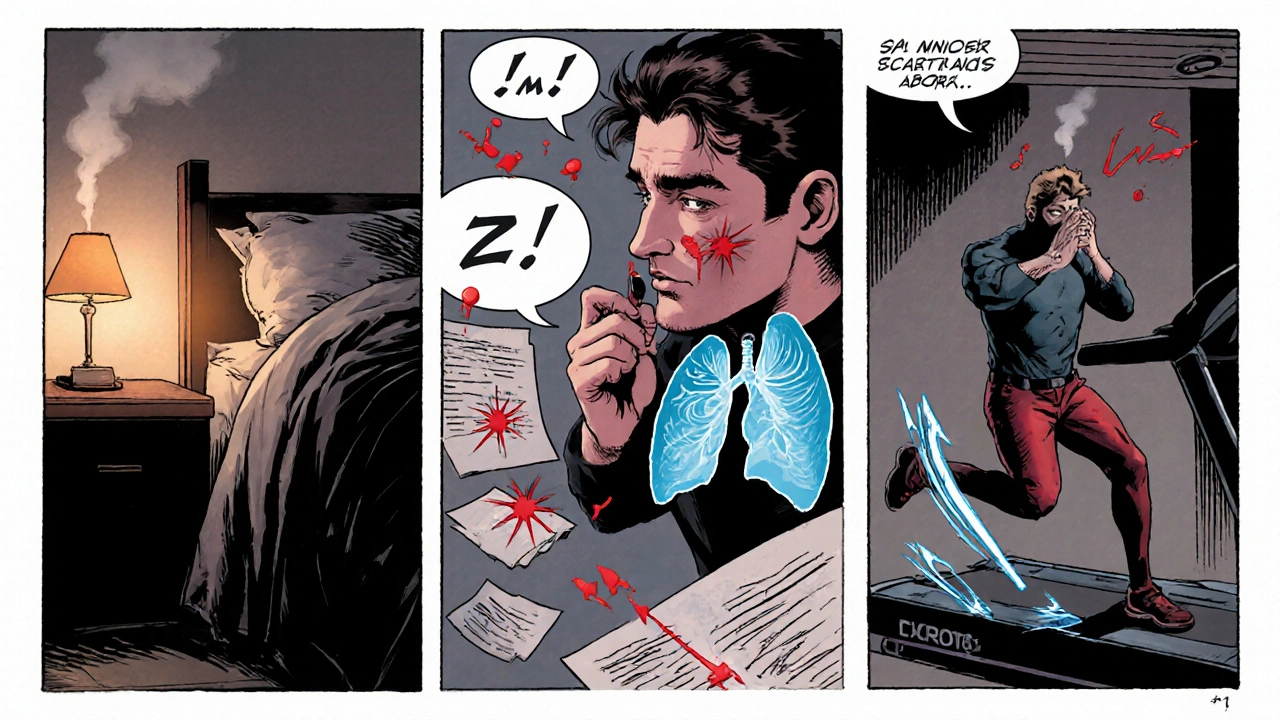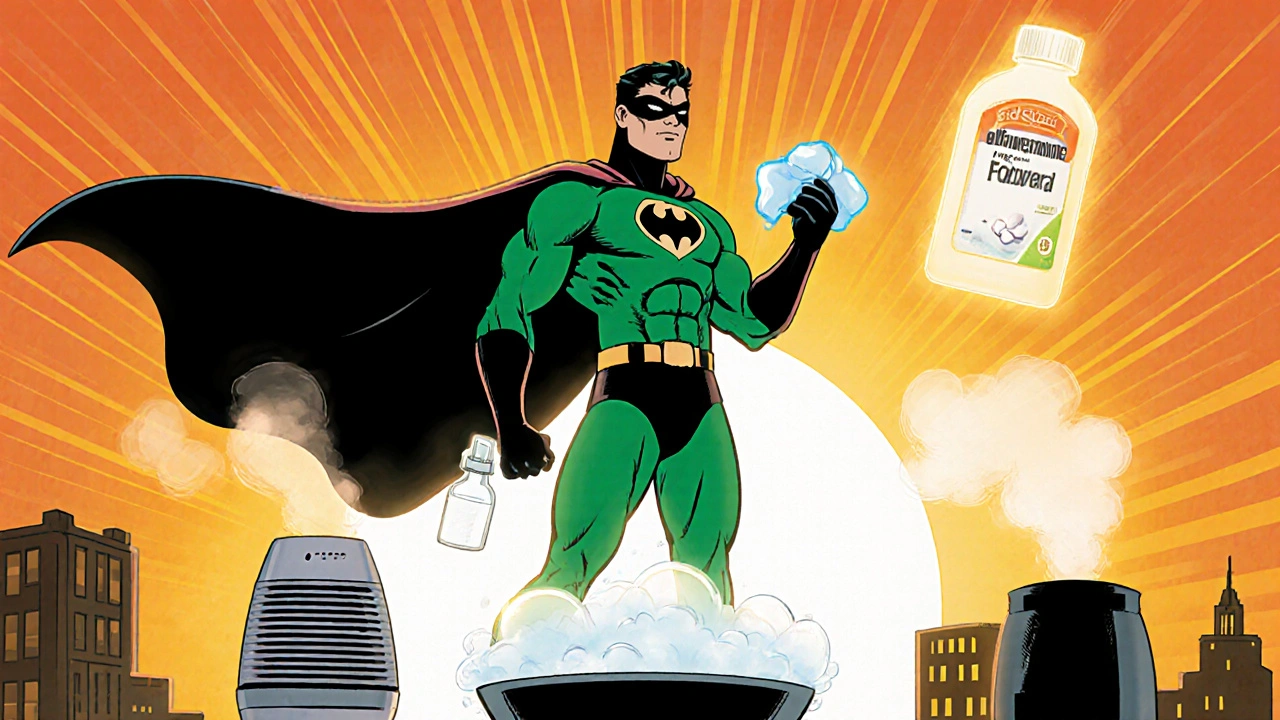Symptom Assessment Tool
How to Use This Tool
Select all symptoms you're experiencing to get a personalized assessment of likely causes and recommended actions.
Ever wonder why a blocked‑up nose and red, watery eyes can make a perfectly ordinary day feel like a marathon? Those two symptoms often travel together, turning simple tasks into uncomfortable challenges. Below we’ll break down what’s actually happening in your body, how it messes with sleep, work, and play, and what you can do right now to get back on track.
What is Nasal Congestion?
Nasal congestion is the swelling of the tissues lining your nose, usually caused by inflamed blood vessels that trap mucus and air. It can be triggered by a cold, allergies, or a sinus infection. When the passages narrow, breathing through the nose becomes a struggle, forcing you to mouth‑breathe and often leading to a dry throat.
Why Do Your Eyes Turn Red and Watery?
Red, watery eyes-known medically as Allergic Conjunctivitis-are the eye’s response to the same irritants that clog your nose. Histamine released during an allergic reaction makes the tiny blood vessels in the conjunctiva expand, spilling fluid onto the surface of the eye. The result: itching, tearing, and that unmistakable pink glow.
How These Symptoms Cripple Everyday Activities
- Sleep quality drops: A blocked nose forces you to breathe through your mouth, drying out the airway and prompting frequent awakenings. Red eyes can sting, making it harder to fall asleep.
- Productivity takes a hit: Brain fog sets in when you aren’t getting enough oxygen through your nose. The constant urge to rub your eyes or reach for tissues interrupts focus.
- Exercise feels impossible: Cardiovascular workouts rely on efficient breathing. Congestion reduces oxygen intake, leaving you winded much sooner.
- Social confidence wanes: Constantly blowing your nose or blinking away tears can feel embarrassing, leading some people to withdraw from meetings or gatherings.
Common Triggers and How to Spot Them
Identifying the root cause helps you choose the right remedy. Below is a quick comparison of the three most frequent culprits.
| Condition | Typical Cause | Duration | Red, Watery Eyes? | Additional Clues |
|---|---|---|---|---|
| Common Cold | Rhinovirus infection | 5‑10 days | Sometimes | Fever, sore throat, gradual onset |
| Allergic Rhinitis | Pollen, dust mites, pet dander | Weeks to months (until trigger removed) | Often | Itchy nose, clear mucus, symptoms improve outdoors |
| Sinus Infection | Bacterial overgrowth after a cold | 2‑4 weeks | Rare | Facial pressure, thick yellow/green mucus, worsens when bending over |

Quick Wins to Relieve a Stuffy Nose
- Steam inhalation: Fill a bowl with hot water, drape a towel over your head, and breathe for 5‑10 minutes. The warm vapor loosens mucus.
- Saline nasal spray: A pinch of salt dissolved in sterile water can rinse away irritants without causing rebound congestion.
- Elevate your head while sleeping: Extra pillows keep mucus from pooling in the sinuses.
- Use a humidifier: Adding moisture to dry indoor air prevents the nasal lining from drying out.
- Try a nasal decongestant spray for no more than 3 days to shrink swollen vessels quickly.
Soothing Red, Watery Eyes
- Cold compress: A chilled washcloth applied for a few minutes reduces vessel swelling.
- Artificial tears: Preservative‑free eye drops dilute excess histamine and wash out irritants.
- Antihistamine tablets: Especially useful when allergies are the primary driver. Look for non‑sedating options if you need to stay alert.
- Avoid rubbing: The mechanical action can damage tiny blood vessels, prolonging redness.
When to Seek Professional Help
If any of these red flags appear, it’s time to book an appointment with your GP or an ENT specialist:
- Fever above 38°C (100.4°F) lasting more than 48 hours.
- Severe facial pain that doesn’t improve with OTC pain relievers.
- Vision changes, such as blurriness or double vision.
- Persistent symptoms longer than 3 weeks despite home treatment.
- Recurring sinus infections (more than three in a year).

Long‑Term Strategies for a Clearer Day
Beyond immediate relief, consider these habits to keep your nose and eyes happy year after year:
- Identify and limit exposure to allergens: Use allergy‑proof pillow covers, keep windows closed during high pollen counts, and clean HVAC filters regularly.
- Stay hydrated: Adequate fluid intake thins mucus, making drainage easier.
- Maintain a balanced diet rich in vitamin C and omega‑3 fatty acids-both support immune health and reduce inflammation.
- Practice regular nasal flossing with a neti pot, especially during allergy season.
- Schedule annual flu and COVID‑19 boosters to lower the chance of viral colds turning into secondary sinus infections.
Quick Takeaways
- Nasal congestion and red, watery eyes often share the same trigger-histamine release.
- Both symptoms can sabotage sleep, focus, and physical activity.
- Simple at‑home methods-steam, saline rinses, humidifiers-work for most mild cases.
- Use antihistamines or short‑term decongestant sprays for faster relief, but watch the usage limits.
- Seek medical advice if fever, severe pain, vision issues, or symptoms persist beyond three weeks.
Frequently Asked Questions
Can a cold cause red, watery eyes?
Yes. When a viral infection irritates the nasal lining, it can trigger a mild form of conjunctivitis, leading to watery eyes. However, the eyes are usually less itchy than in pure allergies.
Are over‑the‑counter eye drops safe for daily use?
Preservative‑free artificial tears are safe for regular use. Drops containing decongestants or steroids should only be used short‑term and under a doctor’s guidance.
How long can I use a nasal decongestant spray?
Limit use to 3days. Longer use can cause rebound swelling, making congestion worse.
Is mouth‑breathing harmful?
Mouth‑breathing can dry out the throat, increase the risk of dental issues, and reduce the filtration of allergens and pathogens that the nose normally provides.
When should I consider allergy testing?
If symptoms flare up seasonally, persist despite OTC antihistamines, or you’re unsure whether allergies or infections are the cause, a skin‑prick or blood test can pinpoint specific triggers.



Jackie Zheng
A quick saline rinse can work wonders, trust me.